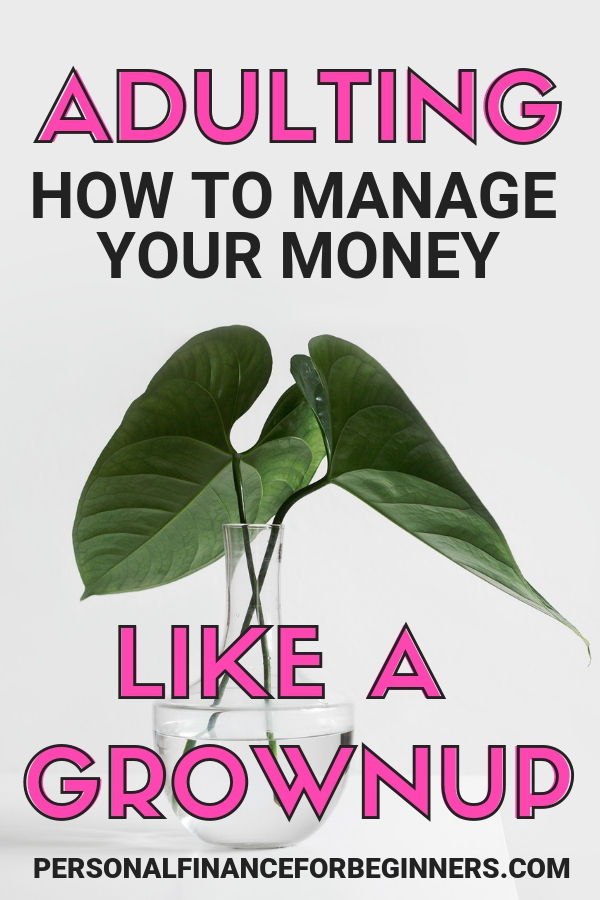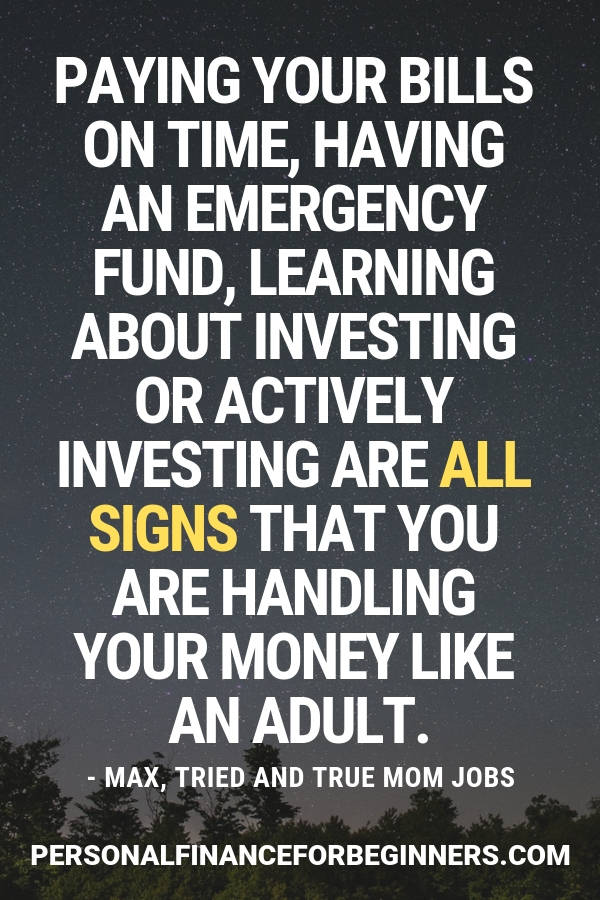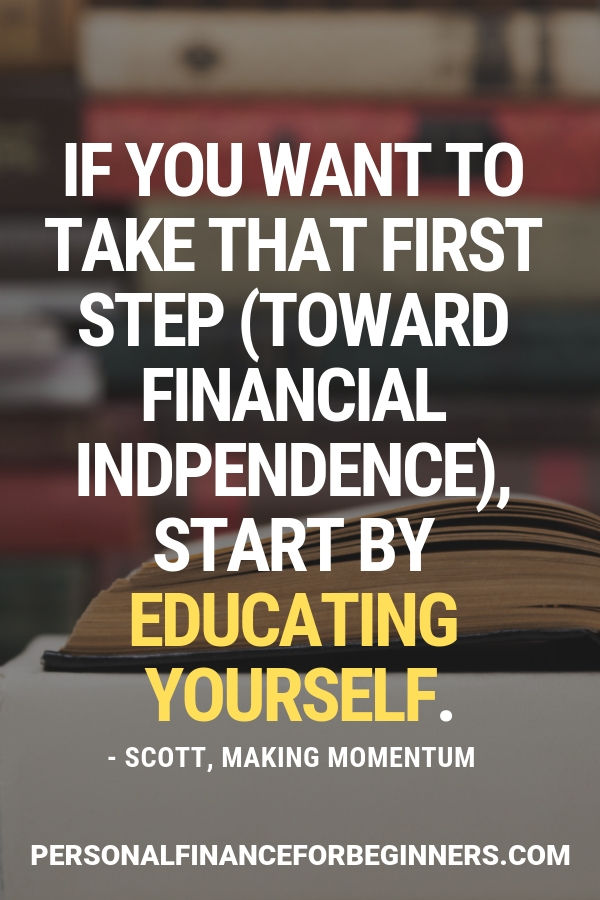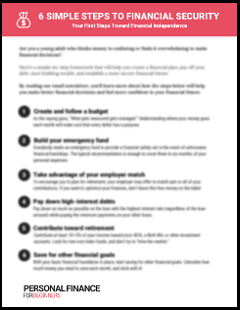Have you ever wanted a blueprint on how to be an adult?
As a child and teenager, it always appeared that the grown-ups in my life had this whole “adulting” thing all figured out.
Of course, as I’ve become an adult myself, I’ve realized that adulthood isn’t always so easy. Many people are still figuring the whole adulthood thing out – especially when it comes to managing money.
There are good examples… Bad examples… And many examples that fall somewhere in between.
While sometimes you have to learn by personal experience, there’s something to be said about learning from the example of others (no need to touch that hot stove!).
In this post, you’ll learn from hundreds of years of vicarious experience from those who know all about “how to adult.”
By the end, you will understand:
- What it means to handle your money “like an adult”
- How to identify what becoming a financially responsible adult looks like
- What steps you can take to start better managing your money
With these insights, you’ll be marking “financially independent” off your adulting checklist in no time!
 A guide to being an adult and managing money
A guide to being an adult and managing money
What does “handling your money like an adult” mean to you?
Steve from Think Save Retire on “can vs should:”
To me, handling your money like an adult means that you finally have money to spend, but that doesn’t mean that you should spend it.
Becoming an adult starts the primary accumulation phase of your life, and the more money that you accumulate during that phase, the shorter that phase will run and earlier you’ll be able to retire.
In short, it means “just because you can doesn’t mean you should” – when it comes to finances or anything else.
Othala Fehu on perspective:
For me, handling money like an adult was all about putting things into perspective.
I had just graduated law school and had just married my wife who graduated the same school a year ahead of me. We were new lawyers, we had decent jobs, but also had over $200,000 in student loan debt. Wow.
I decided to start thinking of it as just another expense that had to be put into the monthly calculation. It has to be dealt with it, there was no way to wish it away.
I started to think of it as a mortgage payment that just, unfortunately, did not come with a house. It is not about the size of the debt, it is about debt management. Bite off a chunk, chew, swallow, repeat.
Michael Dinich from Your Money Geek on making good decisions:
Wait, we’re supposed to act like adults? …Hides $80 GoBots impulse buy.
The funny thing about managing money is most people believe they are making good decisions even when they are not. I have been guilty of this numerous times.
It’s easy to lie to yourself with numbers. How many times have you been in the situation where you said something like, “If I buy this new car, it will save me money on gas or repairs.”
If it’s not a car, maybe it’s the home gym that you were convinced would save you money on your unused gym membership. Perhaps it was an extra large house bought because you are convinced you will need the space for some yet un-launched business.
Managing money like an adult means catching yourself when your “wants” are holding your inner attorney hostage.
You won’t always get it right (cough cough… GoBots), but that’s okay.
Life is about continuous improvement. Success isn’t the lack of failure. Instead, success is working to ensure you win more than you fail.
Spend each day trying to be a bit better than the previous, and you will be a money adult in no time.
Frogdancer Jones from Burning Desire for FIRE on long-term plans:
“Handling money like an adult” is keeping the long-term view in mind.
Only babies spend their money as soon as they get it. An adult has goals and plans that they keep in mind, and they make incremental steps towards them every time their paycheck hits their bank account.
I’ve taught my children that the first step they should do is open a high-interest savings account in an online bank that’s different from the bank that they normally use.
They then save up at least $1,000 for an emergency fund in there as fast as they can. Everyone needs a buffer zone of savings just in case the proverbial hits the fan.
Full Time Finance on consequences:
To me, managing money as an adult means that first time you realize your actions financially have consequences.
Nobody is going to pay your bills or bail you out. You need to save for if something bad happens down the road.
It’s been some time ago for me, but that starting point for me was graduating from college with my large student loans. I quickly realized the only person that would get me out of that debt was me, so I better start to budget for it.
So my advice when becoming an adult, start putting away something immediately to be prepared for the potential rainy day. Perhaps you’ll be lucky enough to never need it, but if you do, your future self will thank you.
Tawnya from Money Saved is Money Earned on long-term goals:
To me, handling money like an adult is when you shift from thinking about (and spending your money on) short-term wants to think about (and spending your money on) long-term goals.
This can take many forms, but essentially you’re no longer thinking about what you want at the moment and acting on it, but what you want throughout your life and planning for it.
Mike from Budget Kitty on emotional triggers:
To me, “handling your money like an adult” means understanding the emotional side of money and what triggers you to make bad financial decisions.
Years ago, I was stuck in a job I absolutely hated. I despised my boss and dreaded going to work every day.
I used my lunch hour to “escape” and more often than not I ended up buying a new book or DVD to add to my collection. I made myself feel better by shopping.
Individually, these were all small purchases, but before long they started adding up to a lot of money (not to mention taking up serious space in my house).
Once I realized that my emotions were linked to my spending, I learned to better control those emotions and limit unplanned purchases.
The FI Way on increasing income:
If you ask my parents or wife, I didn’t actually become an adult until almost 30.
I spent nearly a decade in minimum wage jobs living paycheck to paycheck. You don’t actually become a “financial adult” until you realize, that’s no way to live.
Sure, I could cut down expenses a bit and stay afloat, but that’s not ideal for anyone. Especially those looking to start a family and maintain a reasonable lifestyle.
Some people understand this early. My wife did and pursued a career as a pharmacist when the workforce was short and the salary lucrative.
As soon as she graduated, I saw how important earning more money was…so I focused heavily on building a career. I went back to college, chose a better major, and now our compensation is comparable.
The result was two-fold.
I exponentially earned more, which gave us the opportunity to actually invest money rather than just transferring it. There’s no way to manage cash flow with positive results if it’s net neutral.
You can only reduce expenses so far. Being surrounded by and networking with professionals has allowed me to grow the income column which is much more impactful than saving $3 bucks at a coffee shop.
Adults should focus on earning more over spending less so there’s cash left over to “handle.”
Janet from My Twenty Cents on budgeting:
To me, “handling your money like an adult” means sticking to a budget. It means not spending everything that you earn or have in your bank account.
I have to admit, I used to spend recklessly – I would splurge on $5,000 handbags and $700 shoes because the money was just sitting in my account. I finally felt like an adult when I started sticking to a budget and aiming to save over 50% of my income.
For anyone looking to start managing their money as an adult, I would recommend that they have an honest look at where their finances are: how much debt they have and how much assets they have. Then set a monthly budget and stick to it!
It sounds difficult but it’s really easy once you get the hang of it!
Budgeting is a fun, PG-rated adult activity 😉
Steven from Even Steven Money on your financial future:
Making decisions for my financial future rather than my financial today is what handling my money as an adult means to me.
It started with selling my Mercedes Benz and snowballed into making large credit card and student loan payments. All of those decisions were meant for my financial future.
I could have made minimum payments and lived above my means to make my financial today appear more glamorous, but instead, I chose my financial future and made grown up decisions on how to handle money as an adult.
 Millionaire Mob on repetition and execution:
Millionaire Mob on repetition and execution:
To me, handling your money like an adult means that you have developed a repetition of continuous savings, investing, and budgeting.
You’ve reached a level where you can spend money completely guilt-free because your current (and future) contributions continue to meet and/or exceed your plans.
You have a plan and you execute.
SB and JB of The Debt Sisters on handling expectations:
To us, handling your money like an adult means saying no to certain expectations that family and society places on us.
Instead, we handle our money like adults by doing what makes the most sense based on our specific financial situations.
So many of us receive the message that you’re an adult once you’ve checked things off a list: wedding, cars, house, kids.
All of the items on this list are expensive and they don’t all make sense for every person and on the exact same timeline.
For both of us, home ownership and expensive weddings just don’t make sense and are not current priorities.
We are handling our money and feeling like adults by aggressively paying our debt, living frugally, and saying no on a regular basis to various material items that we want.
Nick from Your Money Blueprint on personal accountability:
Taking ownership. An adult doesn’t blame others for their problems. They recognize their mistakes and learn from them.
Adults that are good with money realize that luck doesn’t make you rich. It is small, repeated daily actions over time that results in great wins.
Adults steer their own ship. They don’t take the passenger seat, or they end up somewhere they didn’t want to be.
It means making the hard choices sometimes and being brave enough to not always follow the crowd.
Finally, being an adult with money requires patience and discipline. For most people, it is a long game.
Peter of Dollarsanity on becoming independent:
Managing money like an adult means that you don’t rely on the bank of mom and dad anymore, you’re on your own.
When in college, I started paying my cell phone bills. That was the moment I started managing money and taking care of my finances.
Pay all your bills on time.
 Max of Tried and True Mom Jobs:
Max of Tried and True Mom Jobs:
To me, handling money like an adult is simply being responsible with your money. Paying your bills on time, having an emergency fund, learning about investing or actively investing are all signs that you are handling your money like an adult. It also means that you don’t spend money you don’t have.
Tuppenny from Tuppennys FIREplace on building an emergency fund:
I’ve managed and mismanaged my money in many different ways over the years.
I remember thinking that I was really on top of my finances the day I had to use my emergency fund for the first time. Previously I hadn’t had an emergency fund, so when stuff happened it was a debt that went on my credit card incurring interest for a good few months.
At some point, I realized I ought to have backup money and set up regular monthly payments into a savings account. I didn’t see it as a significant moment at that point.
When my car broke down and needed £500 of repairs, I had that money already saved so I could pay for the repairs without going into debt.
I remember feeling great relief and satisfaction. I was impressed with myself that I had done something so adult and reaped the rewards of it. I think I was about 24, already married with a kid and a mortgage. Better late than never to become a financially responsible adult!
Becoming an adult with your money
Can you share a specific moment when you first felt like you were becoming an adult with your money?
Andrew from Wealthy Nickel on employer benefits:
I remember the first time I felt like I was handling my money “like a grown-up” was when I got my offer letter for my first job out of college and accepted it.
Part of the offer package was mountains of paperwork on the various benefits programs I could sign up for: health insurance, life insurance, 401(k), HSA, FSA etc.
I had no idea what the difference was between an HSA and an FSA, and Accidental Death & Dismemberment insurance seemed both ridiculous and alarming.
I spent days poring over the pamphlets and reading about the pros and cons of everything. How much was the 401(k) match? How much should I be saving for retirement? Do I need a high-deductible or low-deductible healthcare plan?
All of these decisions seemed just a little surreal.
How can you ask a 21-year-old to plan for retirement and think about life insurance and estate planning?
But once I got into it, I realized I really enjoyed the research process, and learning how to optimize my benefits.
And almost 15 years later, I’m glad I put in the work to make those “grown-up” decisions about my personal finances.
While it didn’t seem like it at the time, the seeds planted back when I thought I wasn’t ready for the real world have grown into a solid financial cushion for me and my family, and peace of mind for the future.
Lily for Merry for Money on financial well-being:
I had just turned 23 years old. While my (ex)boyfriend and I were on the sofa watching Family Guy, I turned to him and said, “I’m 23 years old now. It’s not cute being broke anymore.”
That was the first time I ever said anything like that. Oddly, it was during a FOX cartoon show… But I still consider that a mature money moment for me. 😉
He didn’t see how big of a role financial well-being played on my mental well being. It was partially because he has always been a trust-fund baby so he couldn’t relate.
My income was stunted because of my limited work experience and as a new graduate with little bargaining power.
I still saved every penny that I could. That’s what responsible adults do.
When I “needed” clothes, friend gifts, tech gear for work etc. I went online to make extra spending money. This eventually led me to Amazon MTurk and Fiverr.
Surviving the internet slave wage basement definitely made me grow up quickly, and I’m thankful for that, I really am!
Tim from Life for the Better on being curious:
I remember in high school having a part-time job at the grocery store and setting up my bank account with the local bank.
This simple process made me more and more curious about how money works.
I set up direct deposit and obtained a debit card. I then would watch my account grow and having to pay for my first car. I paid my parents monthly along with gas and insurance.
Since then, I’ve become more of a “grown-up” by going into Edward Jones and handing them a check for $5,500 for my Roth IRA.
This is when I felt that I was truly an adult with my money. I’ve since moved my investments from Edward Jones to Vanguard, but the process is still the same… Keep learning.
The Flawed Consumer on paying off debt:
For me, it was the moment I called my bank to tell them to close our car loan account.
After some serious effort, we paid off our car loan two years ahead of schedule in June of this year.
The relief I felt in finally owning my car and not owing anyone for it was overwhelming, and I felt like I was finally a grown up with money and could be proud of myself.
Ryan from FinanciaLion on educating others:
A few weeks ago, I was helping my girlfriend (who’s now fresh out of grad school) put together her first real financial plan.
I’ve made some great financial decisions and equally (or more so) made some pretty crappy ones, but this was one of the most sincere times where I felt I was managing money like a real “grown-up.”
It’s not even my money and I felt like a hardcore adult.
The first decision we made was how much to save for and where to keep her emergency fund.
This is the first step I’d tell anyone to go after in making their own plan (you’ll start feeling like an adult really quickly).
Her master plan’s now in motion and the saving has begun…cheers to adulting!
Financial Pilgrimage on changing your financial story:
In 2011, we were sitting in a bank lobby applying for a home equity loan because both of our bathrooms were leaking into the basement.
We had nearly $50,000 in student loan debt, a $100,000 mortgage, two car loans, and had just agreed to pay a few hundred dollars a month for a lake house that my parents purchased. At that moment, we realized that we needed to change our financial story.
Nearly $200,000 in debt… We were on a path to rack up much more in the next few years.
If we followed the path our culture pushes, next up would be buying a bigger house, then buying nicer cars, and then a slow and steady increase in all things to accommodate our new lifestyle. Thankfully, we caught ourselves early enough in the process to turn things around.
The FIRE Lane on life insurance:
For me, the pivotal moment was when my newly pregnant wife and I applied for life insurance for the first time.
There is something very adult about this life event. You’re making the decision to spend your earnings for the peace of mind that your family will be taken care of in the unlikely event that you pass away.
Here we are 10 years later still paying the two $30 premiums. I’ve added a policy since then as well. This is a moment unique to marriage and father/motherhood.
My Money Wizard on $100,000 net worth:
No question, my “adult” moment came when I realized my net worth somehow hit $100,000 by age 25.
Before that, I’d been saving and investing money for years. When you’re young and watching your friends blowing their newfound salaries, sometimes you wonder whether saving is even worth it.
But hitting a big milestone early made me realize this whole saving and investing thing really could work for regular people like myself. It was proof the hard work pays off, and it’s what inspired me to start my blog and share my journey.
Eventually, I came full circle and even put together a full guide on adulting, where I share the 10 crucial money lessons I think every new grad should know.
Adam from Minafi on his first investment:
The first foray into investing can be daunting.
It was for me. Just as I was finishing up college, I began to look into what this “investing” thing is that everyone kept talking about.
I ended up opening a brokerage account and was completely lost at what to do next. How do I decide between the vast sea of options?
Luckily, I was investing at a site that offered free trades on a small number of their ETFs.
I chipped in $100 a month into a fund that had “international” in the name and crossed my fingers.
Days later when I checked the account it was up to over $103!
This was the first time I realized I could make money with this investing thing – something that I’ve since leveraged to become financially independent and in more in control of my own time.
JJ from The Debt Hustler on the mantle of responsibility:
My path to financial wisdom and maturity was sparked by the realization that I was caught up in a cycle of family poverty—and that I needed to be the one to put a stop to it.
When I took up the mantle of this responsibility, my relationship with money changed. I started looking at all potential purchases as investments, not just things that I wanted or needed.
I stopped normalizing the idea of hanging on to educational debt for a decade (or more) and made plans to get rid of it as quickly as possible.
I questioned the things that people often said they needed in life to be happy and increasingly embraced a more minimalistic lifestyle and mindset.
And to support all of this, I strengthened my relationships with people who came from a similar background and who were also seeking to change the financial legacy of their families.
This wasn’t just growing up; this was a life-changing soul shift that showed me how strong I really was.
Cody from Fly to FI on the FIRE movement:
Ever since discovering the FIRE (Financial Independence, Retire Early) Movement at age 19, I have handled my money as a grown-up.
This means that I’m tracking every single dollar in and out, understanding how my money can work for me, and creating a long-term financial plan.
Being responsible with your money is one of the most important things you can for yourself. Not because money buys happiness, but because money gives you options.
Rich from PF Geeks on going into “budget mode:”
When my wife and I got married we had all these grand plans for saving and investing, and then three months into our marriage, I lost my job.
I looked back on our finances and realized that even on a dual income we had hardly saved anything at all. We quickly went into “budget mode” and figured out that we were spending over $1000 a month on food for just the two of us.
It took us a while, but we ended up finding a bunch of easy ways to save money that have allowed us to double our savings for the last 3 years straight!
Every time I look back on how far we’ve come, it reminds me that we’re doing a decent job figuring out this adulting thing.
Laura of Pretty Minted on saving yourself:
The first time I realised I had to manage money like an adult was when I realized after two years that no one was going to save me from debt except myself.
For two years I carried a large overdraft in the four figures after I completed university. But instead of working to clear that debt, I just kept spending like I was on that YOLO lifestyle!
I think when we’re young we’re used to parents covering our expenses and I did receive financial help even through university. But my overdraft debt was my own and I had to realize that it was no one else’s responsibility.
That meant learning a lot of financial education, how to budget, how to save money. You’re not taught this stuff in school. That’s when I realised I had to “grow up” about my finances.
How to be an adult with your money
In your opinion, what’s the first step someone should take to start managing their money as an adult?
Miguel from The Rich Miser on automated investing:
I believe that the first step someone should take to start managing their money as an adult is to open a brokerage account (I recommend using a robo-advisor like Betterment), and set up a monthly auto-deposit to that account. It doesn’t matter if it’s a low amount (for now). Just get started.
Mike from MikedUpBlog:
I would venture a guess that many a personal finance blogger would have you first make a budget before taking any other financial steps.
However, it’s difficult to design the best financial plan for your life without first defining your current situation. Where are you on the roadmap?
For this, I would use your favorite spreadsheet or notepad and literally list all of your current debts and their interest rates. Then write down all of your assets.
Do you have a set income every month? What big expenses do you have upcoming in the next 3 months? Alright, how about the next year?
Then, once you know exactly where you are, it’s easier to choose your financial direction. Now you can take out all your great frugal tips and then work on your budget with a deeper understanding of your overall financial wellbeing.
Alex from Daytradingz on personal finance blogs:
Handling your money like an adult is a challenge.
As soon as you leave your parents’ home, you will quickly learn from the management of your finances that there are challenges that you were not aware of until now.
All theory is grey, and everyone aims to achieve financial independence. However, it’s not that simple especially if you stand on your own two feet.
If you take on the challenge, you should regularly read finance blogs. There you can find the best finance-related content – individual and creative – and not just mainstream “blah blah.”
Make sure to start with a very steep learning curve and get things right from the start. That saves time and money.
For me, Rockstar Finance is a perfect starting point for finding excellent financial blogs that fit your personal attitude. I’m most interested in investing. That’s one of the reasons I started my blog.
 Scott from Making Momentum on financial literacy:
Scott from Making Momentum on financial literacy:
Similar to many people from my generation (millennial), managing your money and personal finances wasn’t an often discussed topic around the classroom, dinner table, or among friends.
The first step that helped turn my financial journey around was connected to improving financial literacy. I believe that holds true to most young professionals, recent graduates, or those looking to take control of their personal finances later in life.
So where does that start? Building a foundation of knowledge on the fundamentals of managing your money.
Thankfully there is an abundance of information readily available to start that process. From the best personal finance podcasts to the pillar books on mastering your money, not to mention hundreds of amazing blogs, there is content rooted in actionable advice and strategies to help you start managing your money like an adult.
If you want to take that first step, start by educating yourself. Use podcasts, blogs, books, and conversations to learn tactics and tips on budgeting, saving money, growing your professional income, investing, retirement and the other pillars of your personal finances.
Enoch from Savvy New Canadians on cash flow:
I believe the first step to managing your money is to understand your cash inflows and outflows.
Your financial progress will depend on what you do with your excess funds (i.e. the money you have left after you deduct your expenses from your income).
Therefore, knowing how much you earn, spend, and have left for saving and investing is your first priority for financial success.
Note that the above tip is often referred to as budgeting!
Jon from Compounding Pennies on financial values:
The first step people should take to manage their money like an adult is to understand what you value. Advertisers are great at making us think we need their product, and as a result, we buy without thinking.
We end up getting caught in this web where we keep buying more things thinking all of this will make us happy when in reality, it doesn’t.
When you take the time to understand what you value in life, you can spend your money in a way that will bring you joy and happiness. And you will stop spending on things you don’t value, allowing you to save more money in the process.
The sooner you can do this, the faster you will see yourself building wealth and being able to take advantage of opportunities that come your way because you will have the resources to do so.
Bryan of Bucks and Cents on being honest with yourself:
The first step someone should take to start managing their money as an adult is to be honest with themselves about their current their financial affairs.
Acceptance of whatever their finances are is the first step. They also need to define what their short and long-term financial goals are.
Those two aspects are key to becoming financially educated. Financial education is needed in order to travel and go further on their financial highway.
Everyone has financial goals, and the way individuals manage money in their everyday life is the means in which they get to their goals and achieve them.
Managing money is like their “money car” that they drive. Tracking income and expenses and creating budgets is the financial highway in which people travel on and drive their money car to their goals.
Remember a person can’t build wealth if they are saddled with debt and are sitting on the side of the highway complaining and not trying to fix their money car.
People need to be real with themselves and find a way to get their money car moving. It doesn’t matter how fast their car is going, as long as it keeps driving down their highway towards their financial goals and dreams.
Dylan from Swift Salary on tracking your money:
I think the very first step you should take to start managing your money “like an adult” is to start tracking your spending.
Track every single penny. When you start to do this you’ll become a lot more aware of your spending habits, and once you understand where your money is going each month, it becomes a lot easier to manage.
Now, there are a couple different ways to track your spending: by writing every purchase down, or by using a personal finance app.
The manual writing method definitely takes a bit more time, but since it’s more hands-on it may be more effective for some people. The app method is faster and easier, but it only works if you actually go into the app each week and review your spending.
I recommend that you experiment with both methods to see what works best for you.
Kristy from Money Bliss on paying yourself first:
The first step to managing your money as an adult should be paying yourself first.
Too many times we say “I’ll save for retirement later.”
The honest truth is to start now. Don’t wait another day. This is a lesson that can happen when kids earn commissions around the house to mowing lawns or babysitting as teenagers.
If that day has come and passed for you, stop making mistaking with money and start managing your money as an adult.
On each payday, set aside money for an emergency fund, down payment, retirement, or whatever your goal is.
Challenge yourself each year to increase the amount saved or percentage. Then, you are able to handle all of the curve balls life will throw at you.
Conclusion
Reading this guide is a lot like becoming an adult: there’s a lot to digest!
Some of my favorite take-home messages include:
- Remember that just because you can buy something doesn’t mean you should
- Take responsibility for your own financial future
- Maintain a long-term perspective with your financial plans
- Start small, keep things simple, and be consistent
- Stay curious… Learning doesn’t stop after graduation!
Mastering adulthood isn’t going to happen overnight, but after reading this guide, hopefully you’ll feel a little better prepared on how to make it in life financially.
What does “handling your money like an adult” mean to you?

